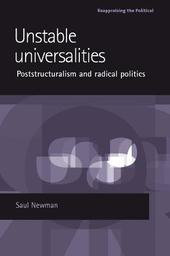
|
Unstable Universalities: Poststructuralism and Radical Politics
Paperback / softback
Main Details
| Title |
Unstable Universalities: Poststructuralism and Radical Politics
|
| Authors and Contributors |
By (author) Saul Newman
|
| Series | Reappraising the Political |
|---|
| Physical Properties |
| Format:Paperback / softback | | Pages:224 | | Dimensions(mm): Height 234,Width 156 |
|
| ISBN/Barcode |
9780719071294
|
| Classifications | Dewey:320.53 |
|---|
| Audience | | Tertiary Education (US: College) | | Professional & Vocational | |
|---|
|
Publishing Details |
| Publisher |
Manchester University Press
|
| Imprint |
Manchester University Press
|
| Publication Date |
1 March 2012 |
| Publication Country |
United Kingdom
|
Description
Unstable universalities, available for the first time in paperback, examines the theme of universality and its place in radical political theory. Saul Newman argues that both Marxist politics of class struggle and the postmodern politics of difference have reached their historical and political limits, and that what is needed is a new approach to universality, a new way of thinking about collective politics. By exploring various themes and ideas within poststructuralist and post-Marxist theory, the book develops a new and original approach to universality - one that has important implications for politics today, particularly on questions of power, subjectivity, ethics and democracy. In so doing, it engages in debates with thinkers such as Laclau, Zizek, Badiou and Ranciere over the future of radical politics. It also applies important theoretical insights to contemporary events such as the emergence of the anti-globalisation movement, the 'war on terrorism', the rise of anti-immigrant racism, and the nihilistic violence which lurks at the margins of the political. -- .
Author Biography
Saul Newman is Senior Lecturer in Political Theory at Goldsmiths, University of London -- .
Reviews'In this original and very well-researched book, Dr Newman tries to re-think the anarchist tradition within a wide intellectual background centered in the general movement from foundational to post-foundational political thought. He proposes the category of post-anarchism, which he links with comparable approaches such as post-structuralism and even post-Marxism. This book will be extremely useful in re-awakening the interest in a current of political thought which has lost its centrality over the past century.' Ernesto Laclau -- .
|